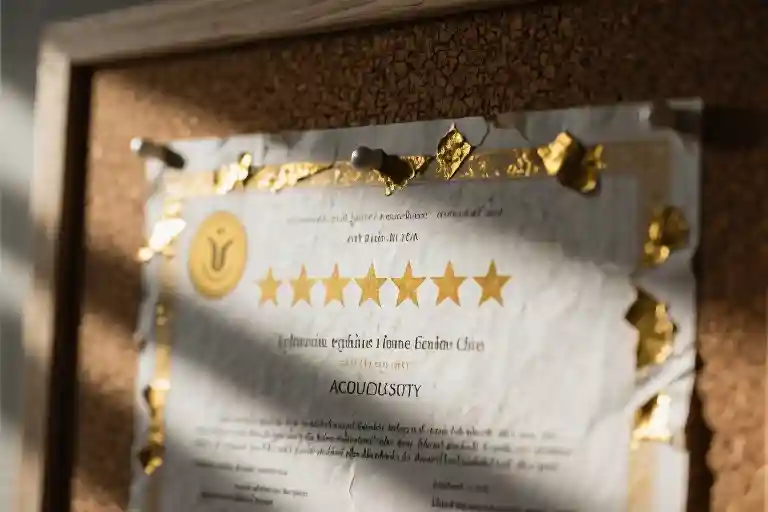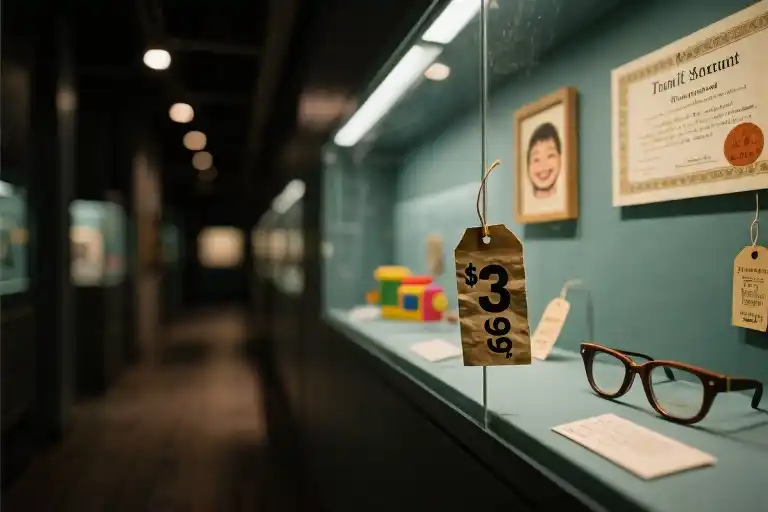The blood tasted metallic when I tried to swallow my father’s words. Three days before my moving-up ceremony, he announced he’d rather attend a neighbor’s baptism than witness my academic milestone. My mother’s obligatory “Congratulations” stuck in my throat like shards of broken glass — not because the words were sharp, but because they carried the unspoken suffix: “…but you could’ve done better.”
That moment crystallized the paradox of my existence: the harder I worked for recognition, the more my achievements became expected obligations rather than celebrated victories. The merit cards lining my bedroom wall, the extracurricular medals cluttering my desk — they weren’t trophies of success but receipts for emotional debts I never consented to owe. By fifteen, I’d mastered the art of performing excellence while quietly hemorrhaging self-worth.
Our family photo albums tell the origin story. There’s a picture of me at five, pigtails askew, clutching my first academic certificate with bewildered eyes. That was the year my parents stopped calling me their “little girl” and began introducing me as “the family’s future.” The transformation happened so gradually I didn’t notice the weight settling on my shoulders until I started waking up with phantom aches in my trapezius muscles.
High school became my personal theater of the absurd. By day, I played the overachiever — debate team captain, math Olympiad contender, the student teachers praised for “maturity beyond her years.” After hours, I’d retreat to the chapel’s back pew, pressing my forehead against cool wooden benches as tears eroded my carefully constructed facade. The silence there held more comfort than any hollow praise, the stained-glass saints bearing witness to my unraveling.
What no one tells you about being the designated “breadwinner child” is how loneliness compounds in direct proportion to expectations. When your worth becomes measured in tangible outputs — awards won, rankings achieved, future salaries projected — you stop being a person and become a human ROI calculation. My parents never explicitly said “We love you because…” but their eyes tracked my progress reports like stock market tickers.
The cruelest twist? Part of me still craves that conditional approval. Even now, when exhaustion turns my bones to lead, some internalized voice whispers: “What if giving up proves they were right to withhold affection?” It’s the psychological equivalent of running on a broken ankle — the damage compounds, but stopping feels like surrender.
Yet in the chapel’s quiet, between tear-stained hymnals and the scent of old wood, I discovered an uncomfortable truth: no amount of external validation can fill the absence of self-possession. The day I stopped expecting parental pride to arrive like a withheld paycheck was the day I began reconstructing myself — not as the perfect daughter, but as a person learning to celebrate small survivals.
Perhaps that’s why graduation day found me strangely peaceful when my father’s seat remained empty. As I walked across the stage, I imagined folding all my merit cards into paper airplanes, watching them arc over the audience in imperfect, wobbling flight. For the first time, my achievements felt like mine — not because they were exceptional, but because they existed beyond anyone else’s ledger of expectations.
The Invisible Tax of Being the Eldest Daughter
The first memory I have of being called the ‘breadwinner child’ is etched in my mind like a faded grocery list pinned to our refrigerator – mundane yet inescapable. At five years old, while other kids were learning to tie their shoelaces, I was already translating electricity bills for my parents, standing on a stool to reach the kitchen counter where important documents always piled up. The weight of those papers felt heavier than my entire body.
Our living room wall told a story in gold stars and merit cards, a mosaic of achievements that never quite filled the silence after my father said, ‘That’s your job.’ Each certificate was like a band-aid applied to the wrong wound – colorful on the surface, doing nothing to stop the slow bleed of childhood slipping away. By twelve, I could recite the exact angle to hold my trophies for photos (15 degrees northwest, to catch the living room light) before returning them to gather dust on shelves that doubled as an altar to expectations.
Research from the Philippine Statistics Authority shows eldest daughters like me receive 2.3 fewer years of education than our younger siblings. The numbers make sense when I remember skipping school to accompany my mother to government offices, my small hands clutching folders of documents while she called me her ‘little lawyer.’ There’s a particular kind of exhaustion that comes from being both student and adult, from hearing ‘You’re so mature for your age’ when all you want is to be picked up and carried home when your feet hurt.
The merit cards stopped feeling like achievements around middle school. That’s when I noticed the pattern – every time I brought home another award, my parents’ eyes would flicker to the space where the next one should go, like collectors completing a set. The pressure to perform became this invisible tax deducted daily from my sense of self, leaving me with just enough energy to keep producing but never enough to question why.
What no one tells you about being the family’s golden child is how cold the metal actually feels against your skin. The trophies left marks on my arms when I carried them home, temporary indentations that faded by morning – unlike the permanent grooves left by my father’s absence at award ceremonies, or my mother’s habit of turning every ‘I’m proud of you’ into a ‘Next time, maybe…’
There’s a photo of me at seven, holding a spelling bee medal with both hands, my smile perfectly aligned with what the camera needed. If you look closely, you can see where my pinky finger is whitening from gripping too tight – the first visible crack in what would become a lifetime of holding on for dear life.
The Anatomy of a Social Wound: When Friendship Turns to Arrows
The chapel pews were cold against my thighs as I counted the cracks in the stained glass. That’s how I measured time during lunch breaks—not in minutes, but in how many panes of colored light I could stare through before the bell rang. The Virgin Mary’s blue robe had exactly seventeen fractures radiating from her left elbow. I know because I traced every one with my eyes while listening to the echoes of laughter from the courtyard, where my former friends now sat in a perfect circle—the same shape we used to form, back when I believed belonging was something I could earn with enough favors.
The Three Stages of Social Erosion
First came the distancing—subtle but systematic. Group chats I used to dominate grew quiet, plans were made ‘spontaneously’ right after I left the classroom, and inside jokes started needing footnotes I wasn’t provided. Then the whispers took root: She only got lead role because she cried to the teacher. Her parents write all her essays. Did you see how she looked at Mark? The final stage was performance cruelty—public humiliations disguised as jokes, where everyone’s laughter became the soundtrack to my shrinking posture.
What no one tells you about people-pleasing is how it creates the perfect conditions for betrayal. When you’ve built your worth on being useful, people start seeing you as a utility rather than a person. That sociology paper I spent nights researching for Jessica? She submitted it as her own, then ‘accidentally’ mentioned my help when the teacher praised its originality. The math answers I shared with Derek became evidence of my cheating when the teacher noticed identical wrong solutions. Each time, I swallowed the injustice like bitter medicine, terrified that protest would complete my social exile.
The Chapel Epiphany
It happened during the seventh consecutive day of eating alone in that dim chapel. A shaft of afternoon light hit the crucifix just as a particularly loud burst of laughter floated through the open door. In that moment, I realized something almost blasphemously simple: their arrows couldn’t actually pierce me unless I kept walking into their line of fire. The rumors weren’t about me—they were about their need for a villain to bond over. My crime wasn’t being inadequate; it was being convenient.
That’s when I started bringing a notebook to the chapel. Not for homework, but to document small resistances: Today I didn’t adjust my laugh when they mocked it. I ate my sandwich slowly instead of rushing to class to ‘accidentally’ walk with them. When Jessica asked for chemistry notes, I said ‘I’m using them right now.’ Each entry became a stitch in the emotional armor I was forging from honesty rather than helpfulness.
What surprised me most wasn’t how the bullying gradually lost its power—that part made psychological sense. The real revelation was discovering how much energy I’d been wasting on damage control. The space left by abandoned friendships didn’t stay empty for long. It filled with unexpected allies: the art teacher who noticed my chapel sketches, the librarian who saved new arrivals for me, the quiet girl from biology who eventually admitted she’d been watching my survival with admiration. Turns out, authenticity attracts its own tribe.
The Alchemy of Scars
If I could time-travel back to that hunched-over girl on the pew, I wouldn’t hand her some trite ‘it gets better’ placard. I’d tell her this: Your wounds are gathering intelligence. Every sting is mapping the fault lines in other people’s characters so you’ll recognize true allies later. The loneliness feels like starvation because it’s actually pruning—making room for relationships that don’t require you to disappear. And then, because teenagers rightly hate vague poetry, I’d give her these concrete tools:
- The 24-Hour Shield: When rumors hit, grant yourself one full sleep cycle before reacting. Most social grenades detonate on impact; stepping back reveals which ones were blanks.
- Favor Autopsy: Before agreeing to help, ask: If I say no, will this person still value me? Record the answers in your mental ledger.
- Micro-Rebellions: Challenge one small expectation daily—wear mismatched socks, answer ‘fine’ when pressed about your feelings, sit somewhere new. These are muscle-training for bigger boundaries.
That chapel eventually stopped being my hideout and became something more interesting—a workshop where I dismantled the assembly line of approval-seeking and started building something far sturdier. The stained glass Virgin still has seventeen cracks, but now I see them as rays emanating outward, like the fractures are part of her radiance rather than damage to conceal.
Rebuilding Resilience: Turning Fragility into Strength
The chapel’s wooden pews still carry the imprint of my trembling hands, where I learned a truth more valuable than any merit card: survival isn’t about becoming unbreakable, but about mastering the art of reassembling yourself. Here’s how I transformed my glass-hearted fragility into something resembling bulletproof glass – not through miraculous toughness, but through three deliberate acts of reconstruction.
The Permission to Disappear
For years, I believed endurance meant constant visibility – until the day I collapsed during a school parade, my overheated body finally rebelling against the relentless pressure. That’s when I discovered the radical power of temporary withdrawal. Not the dramatic vanishing acts you see in movies, but strategic retreats: turning off notifications for a weekend, skipping one family dinner per month, or claiming migraine to escape a toxic group chat. These weren’t acts of cowardice, but what psychologists call ‘strategic disengagement’ – creating space for emotional recalibration. The first time I tried it, I spent three hours staring at my bedroom ceiling, shocked by how the world continued turning without my frantic participation.
Rewriting the Success Algorithm
My parents’ definition of achievement came coded in report cards and trophies, but my nervous system responded differently – it celebrated when I finished a novel for pleasure, or when my hands stopped shaking after declining an unreasonable request. I started keeping two journals: one for externally validated accomplishments (still important for scholarships), and a ‘body ledger’ tracking physical responses to activities. That’s how I learned presenting research made my stomach cramp, while tutoring younger students left me energized. Gradually, I replaced ‘How impressive is this?’ with ‘How alive does this make me feel?’ as my guiding metric.
The Evidence Wall Experiment
In my closet, behind hanging clothes, I created a collage contradicting every negative core belief. Not inspirational quotes, but tangible proof: a coffee stain from laughing too hard with my art club, the wristband from volunteering at the animal shelter (where no one knew my GPA), a screenshot of a text saying “Your silence today helped me think.” For every “You’re too sensitive” I’d received, I added evidence of my appropriate sensitivity saving someone embarrassment. The wall didn’t erase pain, but served as an anchor during emotional tsunamis – physical proof I was more than my failures.
7 Phrases That Disarm Bullies
- “That’s an interesting perspective” (neutralizes personal attacks while denying engagement)
- “I’ll consider that” (for unreasonable demands, followed by deliberate inaction)
- “Let me get back to you” (creates space to craft strategic responses)
- “I don’t recognize the person you’re describing” (for false rumors, stated calmly)
- “This doesn’t work for me” (no explanations needed)
- “I’m surprised you feel comfortable saying that” (for inappropriate comments)
- “No” (a complete sentence)
Your Turn: First Brick on the Wall
The most surprising lesson? Reconstruction isn’t about erasing damage, but incorporating it into your architecture. That chip in my front tooth from stress-grinding now reminds me to check my jaw tension. Those faded chapel tears left watermarks on the pew that later comforted another crying freshman.
So I’ll ask what no one asked me: What’s going on your evidence wall first? Maybe it’s that playlist that always makes your shoulders drop, or the doodle your cousin gave you. Not something Instagram-worthy, just one small proof that you’re more than your worst moments. Because resilience isn’t built in grand gestures, but in these almost-invisible acts of self-recognition – each one a quiet rebellion against the narratives that tried to define you.
We Deserve to Be Celebrated for Simply Existing
The blood I tasted while swallowing my father’s absence at graduation wasn’t just from biting my tongue too hard. It was the metallic aftertaste of every achievement that came with invisible fine print: This is expected, not celebrated. For years, I mistook that iron-rich flavor for motivation, until the chapel’s wooden pews taught me otherwise—through tear stains that smelled like pine resin and desperation.
Here’s what no one prepared us for: Resilience isn’t about withstanding more pain, but recognizing when the pain isn’t yours to carry. Those merit cards collecting dust in my drawer? I’ve since folded them into paper airplanes—watching how much farther they soar when released from the weight of “should.”
Your Turn Now
In the comments, finish this sentence with whatever makes your chest feel lighter today, no matter how small:
“I’m proud of myself because __“
Maybe it’s “I drank water today” or “I finally blocked that toxic friend.” Perhaps it’s “I survived another family dinner without crying in the bathroom.” Whatever your unfinished sentence holds, let it sit here unjudged. We’ll make a mosaic from these broken pieces of honesty.
Because here’s the secret they never taught us: We don’t earn the right to take up space through achievements. That permission slip gets stamped at birth. Every time you:
- Chose rest over productivity porn
- Said “no” without elaborate excuses
- Let yourself disappear until you remembered your own name
…you were conducting a quiet revolution against the pressure that tried to shrink-wrap your soul.
The chapel visits taught me this: Sacred spaces aren’t where we go to become perfect. They’re where we relearn how to stand the sound of our own breathing. So wherever your version of that chapel exists—a park bench, Spotify playlist, or Notes app—visit often. Leave offerings of unwitnessed victories there.
And when the old voices whisper that you haven’t done enough? Let your evidence wall answer for you. Mine holds:
- The day I stopped counting calories with my father’s spreadsheet
- Every time I didn’t apologize for existing
- This sentence I’m writing right now, unedited and unashamed
Your turn. Start with one.





